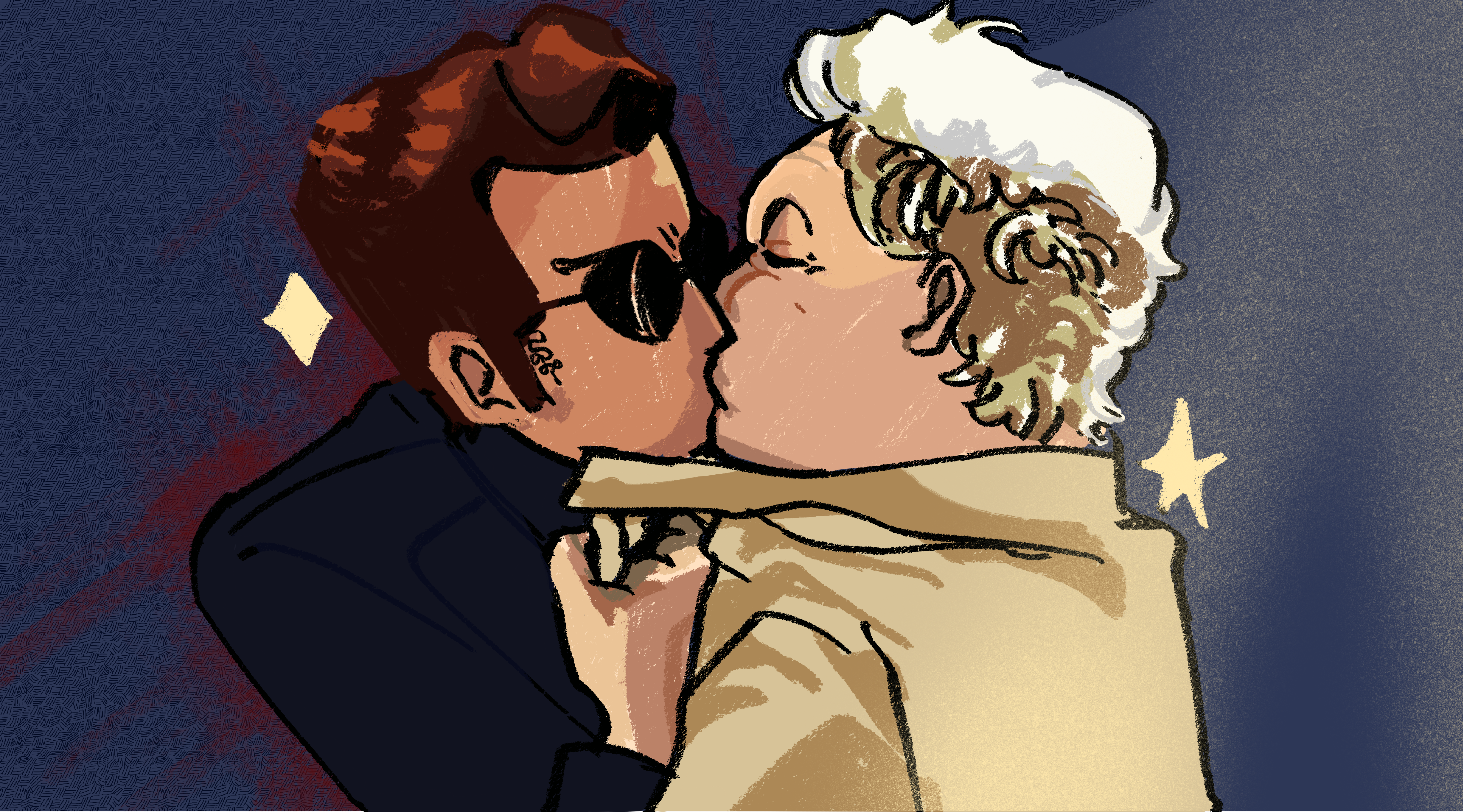An angel and a demon. Heaven and Hell. Eternal enemies—until they fall in love. One would think this is the plot of a preteen’s fanfic writing debut, but in reality, it’s the plot of the highly anticipated second season of Good Omens, released this summer on Prime Video.
Based on Neil Gaiman and Terry Pratchett’s quirky yet brilliant novel Good Omens: The Nice and Accurate Prophecies of Agnes Nutter, Witch, the series follows an angel and demon who team up to prevent the destruction of their beloved world. Building on the first season’s broad exploration of the moral quandaries of Christian theology, season two is a welcome return to the show’s trademark humor and wholesome relationship dynamics. More notably, however, this season expanded upon the subtle queer undertones of its predecessor through its targeted dive into the intricacies of love, loyalty, and the potential for systemic change in the Heaven-Hell dichotomy.
Whereas season one almost directly translated the events of its source material, the events of season two are entirely original. It picks up where its predecessor left off, with the angel Aziraphale (Michael Sheen) and the demon Crowley (David Tennant) living peacefully following their successful avoidance of Armageddon. That is, until the Supreme Archangel Gabriel (Jon Hamm) appears at Aziraphale’s bookshop door without his memory (or his clothes). In the wake of his disappearance, the corporate offices of Heaven and Hell desperately search for him while grappling with the power vacuum left in his absence. This leaves our dynamic demon and angel duo forced to not-so-begrudgingly work together and figure out what happened to Gabriel while avoiding the agents of Heaven and Hell.
In contrast to the complex web of plots and characters that was a hallmark of the first season, season two opts for a much simpler approach. Though jarring at first, the simplicity of the second season leaves room for the story to hone in on Crowley and Aziraphale’s layered relationship. The tension between the two is as old as time itself. By slowing the pace, the audience can watch in greater detail as Crowley comes to terms with his feelings for the adorable angel, and Aziraphale discovers what it is about that devilish demon which eternally attracts him.
The pair’s budding romance has more significance than your typical ship. After the first season’s release, some fans accused the show of queerbaiting: alluding to queer relationships to draw a bigger audience without actually delivering. Other buddy comedies are often guilty of this marketing ploy—whether intentionally or not—psychologically taxing and devaluing their queer viewers. After the events of Good Omens’s second season, though, there is no room left to deny that Crowley and Aziraphale’s mutual feelings were a slow burn rather than a farce.
Crowley’s realization that he’s not the evil bad boy he believed himself to be is integral to this development, which we see as he tries to play matchmaker for another couple. He spends an exorbitant amount of time and effort trying to make Nina (Nina Sosanya), a coffee shop owner, and Maggie (Maggie Service), a record shop owner who has been pining after Nina for years, fall in love.
His development is further captured by key moments throughout the season that unveil the true nature of the angel and demon’s relationship. It is made abundantly clear that their trust for one another goes beyond friendship when Crowley lets Aziraphale borrow his treasured car (which also serves as his permanent residence) and when Aziraphale allows Crowley to shoot a bullet right past his face, despite the demon having never fired a gun before.
All these moments were a perfect build to what is hands-down the best moment of the entire show: the kiss. Oh, the kiss. In this scene, Crowley finally works up the nerve to somewhat confess his feelings for the angel and frantically kisses him as a last-ditch attempt to win him over. Devastatingly, Aziraphale rejects Crowley’s offer to run away together, resigning himself to the fallacious dichotomy between good and evil. Aziraphale instead chooses to take on the job of Supreme Archangel, alienating himself from Crowley in the process. To make matters worse, Aziraphale shows a shocking apathy towards Crowley’s agency when he tries to make Crowley an angel again.
Their conflicting priorities demonstrate that Crowley knows a truth Aziraphale has yet to learn: their relationship cannot thrive within the constraints of Heaven and Hell. The show suggests that queerness cannot exist within the current moral framework of conservative Christianity, and Aziraphale must let go of his black-and-white way of thinking in order for them to be together.
The gripping—if agonizingly slow—buildup of Crowley and Aziraphale’s romance is a testament to Sheen’s and Tennant’s acting prowess. They don’t just inhabit their characters, they become Aziraphale and Crowley. Everything, from Crowley’s trademark swagger to Aziraphale’s tears as Crowley walks out of his bookshop after kissing him, is executed flawlessly.
As Good Omens giveth, so too does it taketh away. Despite the horror of Aziraphale preventing the couple from being, as Crowley says, “an us,” it is still a massive moment for the series. This bittersweet scene beautifully illustrates just how far Crowley has come and how far Aziraphale has to go. While the demon has taken responsibility for his emotions, the angel still hasn’t quite faced the music about his love for Crowley, nor has he accepted the fact that Heaven does not employ the cosmic good guys.
Though the next season is yet to be confirmed, the promise of what is to come for Crowley and Aziraphale makes the continuation of their story an absolute necessity. Whether it be in the depths of Hell, on the far-off star of Alpha-Centauri, or right here on earth, Crowley and Aziraphale are meant to be together.







Best reviewer at Georgetown, hands down. I haven’t even seen the show and somehow I was in as much suspense for the kiss reading this as I would’ve been if I had watched it. She deserves a raise.